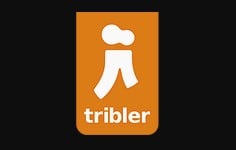
Researchers at Delft University of Technology have secured another €3.3 million in funding for academic research into the ‘Internet-of-Trust’. The money will in large part be used to continue development on the Tribler BitTorrent client. Professor Johan Pouwelse, who leads the Tribler lab, hopes that the software and underlying technology will shake up the entertainment industry by shifting the balance of power.

The Tribler client has been around for nearly 15 years. During that time it has developed into the only truly decentralized BitTorrent client out there.
Even if all torrent sites were shut down today, Tribler users would still be able to find and add new content.
The project is managed by dozens of academic researchers, which is a guarantee for continued development. In recent years alone, the Tribler team added a built-in Tor network to the client, as well as a blockchain that can function as an internal currency.
This week Delft University of Technology announced that its research group has secured an additional €3.3 million to continue building an ‘Internet-of-Trust.’ A large part of this new cash flow will be used to improve the Tribler client.
With financial backing secured for the years to come, project leader Professor Johan Pouwelse has set some big goals. With Tribler, he hopes to lay the groundwork for a new ecosystem that can replace the powerful multi-billion dollar companies that currently dominate the entertainment industries.
Pouwelse wants to put the artists back in control. They, and only they, should be in charge of monetizing and distributing content.
This idea isn’t new. Artists increasingly want to take back their rights. Taylor Swift, for example, spoke up when she learned that her former record label wanted to prevent her from performing her own songs. Meanwhile, Imogen Heap is trying to create a fairer music ecosystem powered by a blockchain.
Professor Pouwelse has followed these developments closely and believes that artists should ultimately be in control of their own work. This means cutting out the middlemen.
“Every artist should be self-published and self-promoted. Without profiteers, more artists will earn their living from their passion. Without profiteers, fans will get more content creation from their idols,” Pouwelse says.
“The music industry is driven by intermediaries that keep the biggest slice of the pie to themselves. Pioneers such as Imogen Heap are creating new business models where artists receive fair compensation for their creativity.”
The ideal to overthrow powerful entertainment industry companies sounds very much like The Pirate Bay’s message during the mid-2000s. However, while Tribler’s torrent client does list a lot of Pirate Bay content, its goal isn’t to advocate piracy.
On the contrary, decentralization may be a step towards limiting piracy, as content can become much cheaper when artists distribute it directly. Right now labels, but also YouTube, Apple, Twitch and many other platforms, take a big cut. According to Pouwelse, that’s a waste of money.
The professor sees a future where content storage and distribution are put back into the hands of individuals. It’s a world where people set their own rules instead of being dictated to by major companies, which also includes Google and Facebook, which often restrict what people can publish.
While this all sounds very ambitious and promising, there is a major problem. In theory, it’s not hard for creators, or people in general, to store and publish everything themselves. The real problem is the exposure and adoption of decentralized alternatives.
Tribler does indeed have all the crucial elements for an artist to release an album and keep 100% of the profits. But when there are only a few thousand users on the platform, these profits are minimal. In fact, they would likely make more if they only made 5% through the regular “middlemen” channels.
This is a real dilemma. In order for decentralized alternatives to work, they need a substantial user base, one that can rival the existing options. Getting there at once will require a miracle of sorts.
Pouwelse understands the challenges but firmly believes that change is possible, especially when BitTorrent and the blockchain work in tandem.
“BitTorrent has not eliminated the golden profits that sit between the artist and your ears. BitTorrent and blockchain are perhaps the perfect mixture for change in the entertainment industry.
“Blockchain might be powerful enough to break the corporate stranglehold on the business and set artists free,” Pouwelse adds.
Whether this vision will eventually become a reality is uncertain. However, the Triber project does provide an excellent use case for what’s possible when it comes to decentralized publishing. In addition, it will also aid the development of other decentralized digital infrastructures.